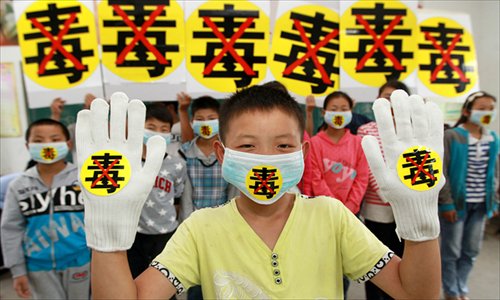Online drug trade targeted
Drug users estimated at 14m aided by Web sales

Students hold up signs that convey the message of "No drugs" at a school in Huaibei, Anhui Province on Wednesday. The event, guided by local police, was designed to educate people to stay away from drugs. Photo: IC

Drug-related crimes on the Internet have been rising in China, a burning issue that could be partly tackled by making Internet service providers more accountable and providing specific judicial interpretations, a drug control official said on Wednesday.
Drug smuggling has become organized and professional, often carried out in covert and cunning ways through multiple and constantly changing channels, including courier services and through the Internet, according to the Chinese government's first report on the country's drug situation released on Wednesday, two days before the International Day Against Drug Abuse and Illicit Trafficking.
With the extensive reach of social media and e-commerce platforms aided by growing smartphone usage, Internet-based drug-related crimes now cover the entire chain of drug trafficking - drug manufacturing, trading and use.
"Online communication, payment and delivery" has become a new trafficking mode, Liu Yuejin, deputy director of the China National Narcotics Control Commission told a press conference on Wednesday.
More young people have been drawn to the crime. China arrested 169,000 drug crime suspects last year, 60 percent of whom were under the age of 35, he said.
By the end of 2014, China had 2.96 million registered drug addicts. Estimates have it that the total number of drug users exceeds 14 million, which means one out of 100 Chinese may have used drugs, he added.
Internet-based drug crimes
The report said suspected drug pushers and addicts communicate through instant messenging, open online stores, pay through online payment systems and deliver drugs through courier services.
"Such approaches pose as a challenge to law enforcement agencies," the report pointed out.
The government is expected to make Internet service providers more accountable, and the Supreme People's Court as well as the National People's Congress are expected to provide judicial interpretations on the conviction standard and punishment specific to "the new criminal patterns," said Liu.
"The Internet provides suspected drug criminals fast and covert access to drugs. Residing in different provinces, they often communicate in an online chat room or use jargon in their posts, which have made it difficult for the police to identify them," a Beijing-based police officer from a drug-control squad, who requested anonymity, told the Global Times.
In December 2014, the police launched a campaign against Internet drug crimes, identifying nearly 100 chat groups on Tencent QQ, an instant messaging service, and about 2,000 QQ accounts. The police seized or monitored more than 700 suspects all over China as well as in Japan, South Korea and Singapore.
Website operators should scrutinize netizens' posts and servers and broadband providers should also examine whether the websites they offer with the hardware are drug related, the police officer said.
Although the crackdown is necessary, providing judicial interpretations specific to new criminal patterns is more urgently needed to more effectively prosecute and sentence suspects, experts said.
"The government should clarify what evidence it considers reliable from online drug-related information," Wang Sixin, a media law professor at the Communication University of China, told the Global Times.
The judicial departments also have to determine under what circumstances shipping companies that deliver parcels containing drugs are considered guilty, Ruan Qilin, a criminal law professor at the China University of Political Science and Law, told the Global Times.
Attracting civil servants
Drug addicts, the majority of whom used to be the unemployed, private business owners, peasants and migrant workers, now include employees in enterprises and public institutions, celebrities and even civil servants, according to the report.
Since 2014, Beijing police have detained at least 14 celebrities on drug charges, including Hong Kong movie star Jackie Chan's son, Jaycee Chan.
Dismissing speculation that celebrities are being singled out by the police, Liu said that the Ministry of Culture and State Administration of Press, Publication, Radio, Film and Television have been considering a code of practice to discipline them.
He stressed that the media watchdog will take tough measures on celebrities who are caught by police taking drugs several times.
As to civil servants, Liu told the Global Times that more than 1,400 have been investigated so far. Most were discovered by tip-offs and people who confessed in other cases that the civil servants they know are drug addicts.
Gong Weiguo, the mayor of Linxiang, Central China's Hunan Province, is being investigated following allegations he took drugs in April.
Three people were executed Wednesday in the largest drug case to be heard in Liaoning Province, a local court said.
Ma Min, Yao Hongguo and Li Na were found guilty of smuggling 2,000 methamphetamine pills and 36 kilograms of the drug, the Liaoning provincial high people's court said in a press release.
Zhang Hui and Xinhua contributed to this story